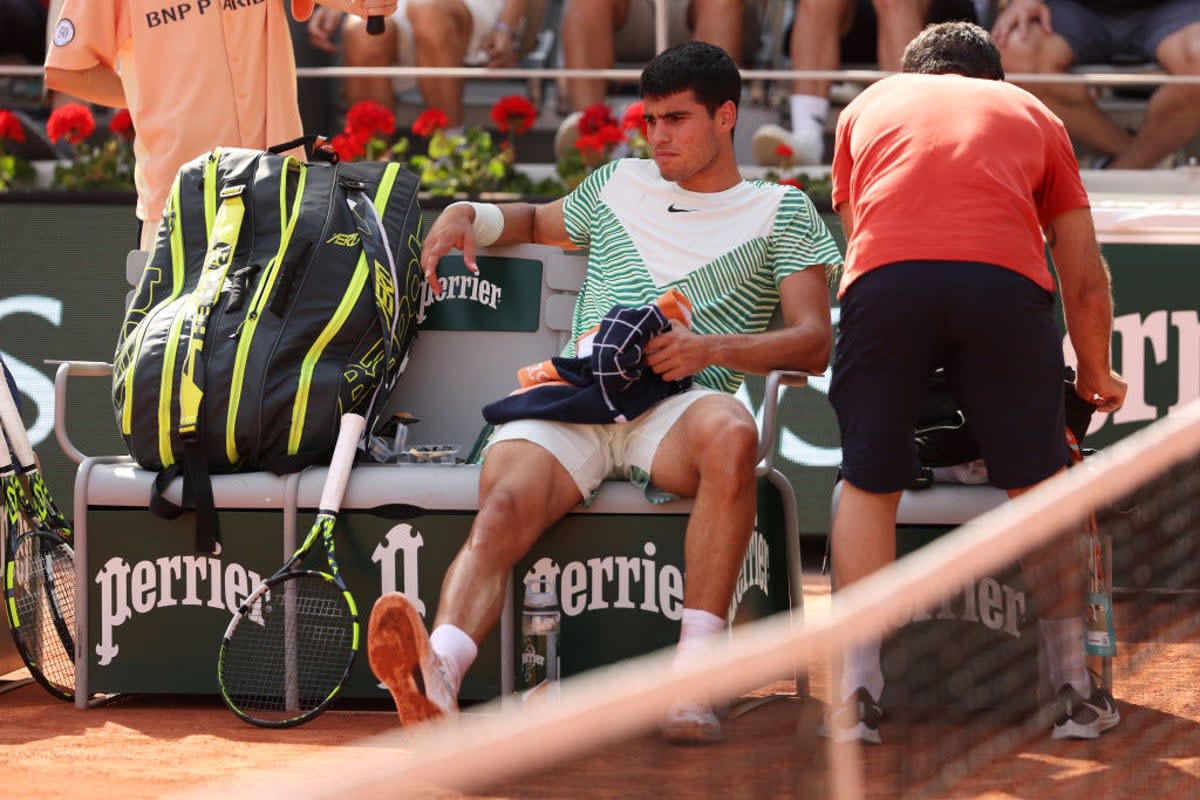What happened to Carlos Alcaraz at the French Open? It was all down to Novak Djokovic
In the end, Novak Djokovic was right: Carlos Alcaraz may have won their only previous meeting, but best-of-five at a grand slam was always going to be different.
So it proved. For well over two hours, the most-anticipated match of the year lived up to the hype. Djokovic and Alcaraz traded blows and held the French Open crowd in their spell. Djokovic needed to be at his highest level to take the first set 6-3, then Alcaraz found his spark and raised his own game to win the second 7-5. A third set of equal brilliance beckoned, as did a fourth and even a fifth. Djokovic, 36, won 6-3 5-7 6-1 6-1.
But then Alcaraz stopped. After jumping on a Djokovic serve, he pulled up and felt his lower right leg. His calf had seized painfully, and the cramps began to spread around his body. “Not only the legs,” Alcaraz said. “The arms, as well.” It was a different match from then. Alcaraz refused to quit but it was a non-contest. The Spaniard, so thrilling when in full flight, moved like a bird whose wings had been clipped.
Such physical difficulties are not uncommon for players at this stage of their career. Despite already rising to world No 1, Alcaraz’s development is still in its formative years. The Spaniard has only recently turned 20 and was playing in his second grand slam semi-final, in what was the hottest day of the tournament so far in Paris.
It was jarring, however, to see Alcaraz suffering. His rapid ascent to the top of the game had come without displaying any serious weaknesses. He is already a grand slam champion and had already triumphed in marathon matches. His US Open victory last September came after defeating Jannik Sinner in five hours and 15 minutes in the quarter-finals, in a match that also featured long rallies and rarely dipped in its intensity.
Alcaraz always plays at full pace and that was the game plan against Djokovic as well. But facing the 22-time grand slam champion requires perfection, especially in the big points. In the early exchanges, Alcaraz looked irritated, frayed and under pressure as he committed errors from the baseline. It was uncharacteristic from a player who usually performs with such a positive attitude. He was under significant stress, and it was notable that Alcaraz repeatedly turned and gestured to his box throughout the opening set.
Djokovic played Alcaraz at his own game, taking the ball early in an aggressive approach that disrupted the Spaniard’s rhythm. Djokovic’s control and precision on his service games pushed Alcaraz’s defensive capabilities to their limits. For Alcaraz, there was never a lost cause, never a Djokovic drop shot or lob that he could not reach, but all those sprints and hard efforts eventually added up.

It is perhaps only now that Alcaraz and everyone else realises how different a proposition facing Djokovic at a grand slam really is. “It’s not easy to play against Novak,” he explained. “If someone says that he gets into the court with no nerves playing against Novak, he lies. Of course, playing a semi-final of a grand slam, you have a lot of nerves, but even more with facing Novak. Next time that I’m going to face Novak, I hope to be different, but the nerves will be there.”
“The tension. The tension of the match,” he continued. “The tension of the first set, the second set, it was really intense two sets. Really good rallies, tough rallies, drop shots, sprints. It’s a combination of a lot of things. But the main thing, it was the tension that I had all the two first sets.”
Djokovic was pushed to his maximum level as well, but the Serbian was playing his 45th grand slam semi-final, in his 17th year at the French Open. Djokovic has been joined by Alcaraz at the top of the sport but this was an occasion in which experience proved invaluable. Djokovic was sympathetic, and realised what had happened.
“I can understand the emotions and circumstances that affect you mentally and emotionally,” he said. “Being in one of the greatest tournaments of the world, maybe for the first time in his career he was expected to win. He was maybe not an underdog, chasing the title and trying to win against a favourite. But it was probably the other way around. So maybe that affected him.”
“You have to learn from these kind of matches,” Alcaraz suggested. He has time on his side, Djokovic said as much at the net after wrapping up the victory.
Djokovic now has the chance to move ahead of Rafael Nadal with a men’s record 23rd grand slam victory. He will face last year’s runner-up Casper Ruud, who made it back-to-back French Open finals after swatting aside Alexander Zverev. Ruud came into Roland Garros low on confidence but has found his groove round-by-round and showed ruthlessness to defeat Zverev in straight sets.
But the aura of Djokovic looms and, for this year at least, it was a challenge that proved a step too far even for the world number one.
